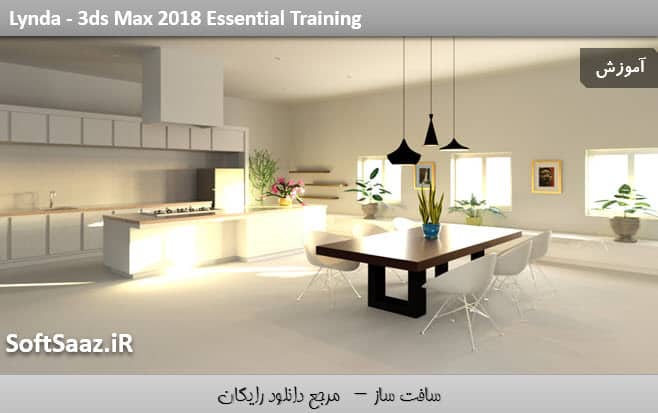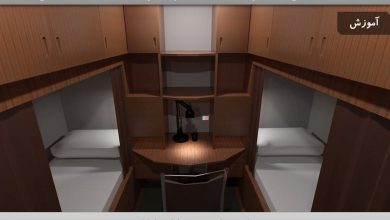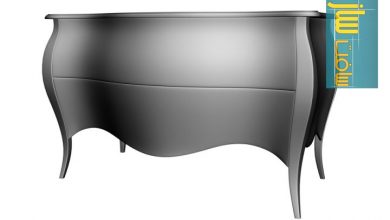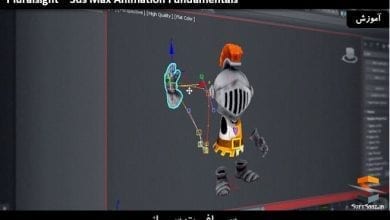آموزش کامل نرم افزار 3ds Max 2018
Lynda - 3ds Max 2018 Essential Training

آموزش کامل نرم افزار 3ds Max 2018
3ds Max یکی از بهترین برنامه های شناخته شده برای مدلینگ و ابزار رندرینگ است که از این نقاط قوت برای استفاده در معماری ، ساخت ، توسعه بازی ، طراحی صنعتی و موشن گرافیک استفاده می شود. ده ها ویژگی و تکنیک برای استاد شدن از اسکالپتینگ و تکسچرینگ تا رندرینگ و نورپردازی در این آموزش وجود دارد. در این دوره تری دی مکساز سایت Lynda ، از ابتدا تا مهارت های لازم و ضروری یک هنرمند 3D برای ایجاد مدلهای حرفه ایی و انیمیشن سازی را پوشش می دهد.
یاد می گیرید که چگونه اینترفیس را با توجه به گرایش و پایپ لاین تولید سفارشی سازی کنید . مدلینگ آبجکت های مختلف را با استفاده از spline ، NURB ، polygons , subdivision surfaces و ابزارهایی نظیر Paint Deform یاد خواهید گرفت. سپس چگونگی ساخت سلسله مراتب ، افزودن دوربین و نور به صحنه ، انیمییت کردن کی فریم ها را در دستور کاری خواهیم داشت. مربی دوره ، Aaron F. Ross ، نگاهی عمیق به متریال ها و تکسچر مپینگ و همچنین آپشن های رندر که شامل معرفی انجین آرنلود ، رندر پروداکشن جدید ، را خواهد داشت. با سافت ساز همراه باشید.
عناوین اصلی این دوره آموزشی:
- سفارش سازی و پیکربندی اینترفیس
- سلکشن ، داپلیکیت و ویرایش آبجکت ها
- کار با sub-objects در modifier stack
- انجام مدلینگ چند ضلعی و subdivision surface
- اسکالپتینگ و مدلینگ Freeform
- مدلسازی با splines و NURBS
- لینک آبجکت ها در hierarchies
- فریمینگ شات با دوربین ها
- ایجاد و ادیت کی فریم ها
- کنترل نور ها و سایه ها
- ساخت متریال
- تکسچر مپینگ
- رندرینگ توالی
لطفا قبل از دانلود پیش نمایش دوره را مشاهده فرمایید:
عنوان دوره : Lynda – 3ds Max 2018 Essential Training
سطح : مناسب برای همه
زمان کل دوره : 10 ساعت و 10 دقیقه
تعداد فایل های تصویری : 119
سال آموزش : 2017
فایل تمرینی : دارد
مربی دوره : Aaron F. Ross
نرم افزار : 3ds Max 2018
زیرنویس : ندارد
Lynda – 3ds Max 2018 Essential Training
3ds Max is best known for its modeling and rendering tools. These strengths come into play in architecture, manufacturing, game development, industrial design, and motion graphics. There are dozens of features and techniques to master, from sculpting and texturing to lighting and rendering. This course covers 3ds Max from the ground up, providing an overview of the entire package as well as essential skills that 3D artists need to create professional models and animations.
Learn how to get around the 3ds Max interface and customize it to suit your production pipeline. Discover how to model different objects using splines, NURBS, polygons, subdivision surfaces, and tools such as Paint Deform. Then, find out how to construct hierarchies, add cameras and lights to a scene, and animate with keyframes. Author Aaron F. Ross also takes an in-depth look at materials and texture mapping as well as the rendering options, including an introduction to Arnold, the new production renderer.
Topics include:
Customizing and configuring the interface
Selecting, duplicating, and editing objects
Working with sub-objects in the modifier stack
Performing polygonal and subdivision surface modeling
Freeform modeling and sculpting
Modeling with splines and NURBS
Linking objects in hierarchies
Framing shots with cameras
Creating and editing keyframes
Controlling lights and shadows
Building materials
Mapping textures
Rendering sequences
1. Getting Started
Choosing a workspace 1m 42s
Customize user Interface and defaults 1m 47s
Setting preferences 3m 40s
Using project folders 5m 4s
2. 3ds Max Interface
Getting familiar with the interface 6m 45s
Using the Create and Modify panels 3m 50s
Navigating in viewports 7m 24s
Transforming objects with Move and Rotate 5m 43s
Using hotkeys 3m 11s
Specifying display units 3m 7s
Specifying system units 4m 17s
Defining the Home Grid 3m 27s
Choosing shading modes 4m 26s
Configuring viewports 2m 21s
Customizing colors 4m 6s
Customizing hotkeys 5m 18s
3. Manipulating Objects
Choosing a coordinate system 4m 17s
Choosing a transform center 3m 7s
Duplicating objects with Array 6m 10s
Duplicating objects with Clone 5m 11s
Using Isolate Selection and Lock Selection 2m 11s
Working with the Scene Explorer 2m 53s
Selecting with Window/Crossing 3m 20s
Collecting objects in Groups 6m 16s
4. Using the Modifier Stack
Understanding level of detail 6m 1s
Moving a pivot point 2m 43s
Selecting sub-objects 3m 26s
Building a modifier stack 4m 51s
Understanding topology dependence 4m 12s
Using a Volume Select modifier 5m 42s
Clearing a selection in the stack 3m 10s
Collapsing the modifier stack 8m 50s
5. Spline Modeling
Creating a line 8m 14s
Editing vertex types 4m 58s
Revolving a surface with a Lathe modifier 3m 49s
Editing Splines 3m 51s
Adjusting level of detail with Interpolation 3m 45s
Understanding NURBS 4m 42s
Importing Illustrator paths to 3ds Max 5m 49s
Rendering splines 3m 39s
Adding a Bevel modifier 5m 35s
Creating a TextPlus primitive 5m 52s
Lofting with the Sweep modifier 4m 11s
6. Polygon Modeling
Creating an image plane 8m 23s
Tracing an image plane 5m 56s
Creating solid geometry with Extrude modifier 1m 57s
Adding edges with Cut 4m 16s
Correcting topology with QuickSlice 6m 14s
Preparing Boolean operands 8m 55s
Cutting with Booleans 4m 48s
Creating doors and windows 5m 44s
7. Sub-Object Polygon Editing
Constraining sub-object transforms 4m 52s
Detailing with Chamfer 5m 45s
Branching with Extrude 5m 45s
Simplifying geometry with Remove 6m 21s
Welding vertices 4m 43s
8. Subdivision Surface Modeling
Understanding subdivision surfaces 2m 44s
Preparing for subdivision surfaces 5m 27s
Adding the OpenSubDiv modifier 1m 51s
Shaping with Editable Poly Ribbon tools 6m 30s
Baking subdivisions 3m 27s
9. Freeform Modeling
Sculpting with Paint Deform 8m 6s
Using Paint Deform brushes 6m 27s
Setting paint options 3m 37s
Controlling brush options 3m 34s
Conforming one object to another 7m 17s
Sculpting with Conform Transform 3m 28s
10. Hierarchies
Understanding hierarchies 3m 23s
Transforming pivot points 5m 4s
Rotating in Gimbal coordinate space 5m 43s
Setting rotation Axis Order 5m 9s
Linking objects 6m 32s
Locking transforms 3m 29s
Avoiding problems with scaling linked objects 9m 50s
11. Layout and Modeling
Merging scenes 3m 29s
Referencing scenes with Xref Objects 6m 7s
Managing display layers 5m 50s
Creating a target camera 3m 51s
Creating a free camera 5m 16s
Enabling safe frames 3m 41s
Choosing aspect ratio in Render Setup 4m 26s
12. Keyframe Automation
Setting up Time Configuration 6m 18s
Creating keyframes in Auto Key mode 4m 22s
Creating keyframes in Set Key mode 3m 52s
Editing animation in the Timeline 4m 50s
Editing animation in the Dope Sheet 4m 34s
Interpolating keys in the function Curve Editor 6m 41s
Moving position keys with Motion Paths 6m 40s
13. Lighting
Creating photometric lights 4m 21s
Controlling viewport quality 3m 14s
Adjusting light Intensity and color 4m 4s
Adjusting exposure control 6m 37s
Using the ART renderer 5m 52s
Adjusting light shape 3m 49s
Adjusting light distribution 6m 38s
Creating a sun and sky
8m 19s
Previewing renders with ActiveShade 3m 15s
Using the Light Explorer 7m 45s
14. Materials
Using the Compact Material Editor 6m 17s
Using the Slate Material Editor 6m 52s
Managing scene materials and sample slots 7m 4s
Adjusting standard material parameters 4m 13s
Adjusting physical material parameters 8m 49s
Assigning multi/sub-object materials 6m 44s
15. Mapping Textures
Placing 3D procedural maps 8m 24s
Mapping bitmap image files 4m 55s
Tracking scene assets 11m 59s
Projecting UVs with UVW Map 9m 39s
Using Real-World Map Size 5m 24s
Painting on objects with Viewport Canvas 2m 10s
16. Rendering
Choosing a renderer 5m 47s
Choosing render output file options 4m 53s
Rendering a preview animation 9m 17s
Playing image sequences in the RAM Player 4m 26s
Setting Arnold render options 10m 24s
Rendering an image sequence 4m 1s
حجم کل :

برای دسترسی به کل محتویات سایت عضو ویژه سایت شوید
برای نمایش این مطلب و دسترسی به هزاران مطالب آموزشی نسبت به تهیه اکانت ویژه از لینک زیر اقدام کنید .
دریافت اشتراک ویژه
مزیت های عضویت ویژه :
- دسترسی به همه مطالب سافت ساز
- آپدیت روزانه مطالب سایت از بهترین سایت های سی جی
- ورود نامحدود کاربران از هر دیوایسی
- دسترسی به آموزش نصب کامل پلاگین ها و نرم افزار ها
اگر در تهیه اشتراک ویژه مشکل دارید میتونید از این لینک راهنمایی تهیه اشتراک ویژه رو مطالعه کنید . لینک راهنما
For International user, You can also stay connected with online support. email : info@softsaaz.ir telegram : @SoftSaaz
امتیاز
جمع امتیاز
لطفا به این آموزش امتیاز بدهید





